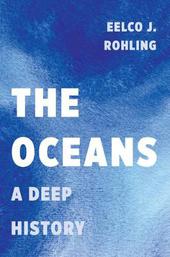
|
The Oceans: A Deep History
Hardback
Main Details
| Title |
The Oceans: A Deep History
|
| Authors and Contributors |
By (author) Eelco J. Rohling
|
| Physical Properties |
| Format:Hardback | | Pages:272 | | Dimensions(mm): Height 235,Width 152 |
|
| Category/Genre | Global warming |
|---|
| ISBN/Barcode |
9780691168913
|
| Classifications | Dewey:577.709 |
|---|
| Audience | | General | | Tertiary Education (US: College) | | Professional & Vocational | |
|---|
| Illustrations |
17 b/w illus.
|
|
Publishing Details |
| Publisher |
Princeton University Press
|
| Imprint |
Princeton University Press
|
| Publication Date |
21 November 2017 |
| Publication Country |
United States
|
Description
The 4.4-billion-year history of the oceans and their role in Earth's climate system It has often been said that we know more about the moon than we do about our own oceans. In fact, we know a great deal more about the oceans than many people realize. Scientists know that our actions today are shaping the oceans and climate of tomorrow--and that if
Author Biography
Eelco J. Rohling is professor of ocean and climate change in the Research School of Earth Sciences at the Australian National University and at the University of Southampton's National Oceanography Centre Southampton.
Reviews"Paleoceanography, Rohling's area of expertise, is the study of ancient oceans and ancient climates as they changed and developed together over geologic time. It involves analyzing data like layers of sediment taken from the seabed. Much alarming information can be learned this way, as Rohling demonstrates, about how today's oceans are likely to respond to climate change--with greater acidification, sea-level rise, mass extinction and so forth. But because storms leave no geological record, the precise effect of global warming on hurricanes is harder to gauge. Still, Rohling is confident that the combination of rising sea levels and some form of increased storm intensity 'spells doom' for the world's coastal regions. For surfers, rooting for hurricane swell may be increasingly difficult to rationalize."---James Ryerson, New York Times "Rohling's work is extensive and informative." * Publishers Weekly * "The Oceans is extremely thorough, appropriately so for a topic of such profundity. The book also covers a tremendous amount of ground with dizzying speed." * Foreword Reviews * "If you want to understand the planet and climate change, this book is for you."---John R. Platt, EcoWatch "For science readers looking for something new, [The Oceans] is a treat."---John Farrell, Forbes.com "The density of information and Rohling's clear, concise explanations make for exhilarating reading, not least because his delight in his subject matter is so palpable. Most importantly though, Rohling's long view makes clear the vast scope of the transformation of the oceans taking place around us, underlining not just the effect on ecosystems and biodiversity, but also its geological scale."---James Bradley, The Australian "In an incredibly detailed 262-page hardcover volume titled The Oceans: A Deep History, Rohling shakes up every reader who . . . [dives] into the massive amount of worrisome information"---Judy Siegel-Itzkovich, The Jerusalem Post "The Oceans: A Deep History oozes with the enthusiasm and passion that Eelco has for geology and palaeoceanography and the awe that he has for how the Earth came to be what it is today. . . . A brilliantly masterminded book, full of necessary detail that builds a compelling argument from 4.6 billion years of evidence and which culminates in an undeniable conclusion."---Jennifer D. Stanford, The Holocene "This book is not only an invaluable introduction to the cutting-edge science of palaeoceanography but also a crucially important text for students approaching all different fields of marine sciences."---Roberto Danovaro, Current Biology Magazine "Very informative, extensive, and full of necessary detail . . . . this book clearly teaches the many relevant lessons needed to understand the climate change of today and what happens when our atmosphere and oceans change."---Miguel Furtado, Conservation Biology
|